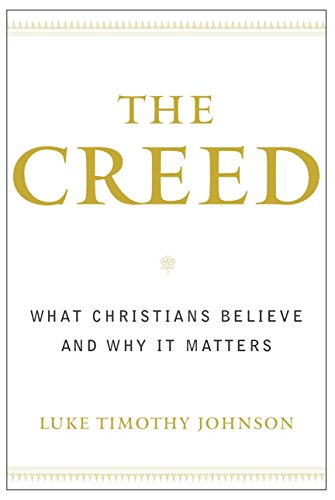This week we begin the first part of article two of the Creed which speaks of the divinity of Christ Jesus. Please read chapter 4 “And in One Lord Jesus Christ” of Luke Timothy Johnson’s The Creed: What Christians Believe and Why it Matters. This first part of the second article was written in opposition to the teachings of Bishop Arius who taught the Son or Logos was part of the created, not the divine, order. I have attached excerpts from Jaroslav Pelikan’s Emergence of the Catholic Tradition (pp.179-210) and David Willis’s Clues to the Nicene Creed (pp.60-81). Pelikan takes us through the different streams of thought that lead to the Nicene formula. Pelikan can be a bit dense. Willis provides a more accessible overview of these same issues. If you have the opportunity, please read through these secondary materials and try to understand Arius’ teachings that lead directly to the call of the Council of Nicaea (325) and later Constantinople (381). (A good discussion of Arius is found on p.193 of Pelikan.) Arius saw himself as a faithful orthodox Biblical Christian priest and if we understand his argument we should have a better understanding of what the Creed is trying to say.
In college (and for a while thereafter) Arius was my favorite pre-Reformation theologian. I saw Arius as an early Protestant who sought to demystify and demythologize Christianity, and to bring Christianity back to its Biblical roots and back to being reasonable and logical. For me, Arianism presented the simplest and most Biblical explanation of who Jesus was. Words such as “Trinity” or “consubstantial (homoousios)” don’t appear anywhere in the Bible. The Creed requires us to split the difference between the words “begotten” and “born” which have the same general meaning. The Creed also requires us to ignore the Old Testament concept that the “Son of God” refers either to David and his descendants (2 Sam. 7:14) or the people of Israel as a whole (Ex. 4:22) and never to someone being Divine. Zeus has divine children; the God of Abraham does not.
There are parts of the New Testament, particularly in John’s gospel, where Jesus appears to be called God, such as in the “I am” statements and Jesus’ own statement that “I and the Father are one.” John 10:30. However, if we dispense with Tradition and simply read the words as written, they could also be seen as words of agency and not essence. Jesus and God are one in the same way that an agent and a principal are the same. Having an agent present with an unlimited power-of-attorney is the same as having the principal himself present. To say Jesus is God is simply to say that he acted with the full power and authority of God and nothing more. And the Bible is very clear, that the Logos was “created” by God. Prov. 8:22, Col. 1:15. Therefore, it was only when we read the Bible in light of later tradition, and not as intended, that we can reach the conclusion that Jesus is truly God. And since I believed in sola scriptura, the words of scripture and not tradition must prevail.
I also found Arius’ teaching to be reasonable and to preserve the dignity and uniqueness of God. The idea that God, who is all-knowing, all-powerful, and exists outside of time would insert himself into time, as an individual who grows (changes) in wisdom and stature (Luke 2:52) is simply absurd. Like the Reformers who later overturned other doctrines I thought absurd (such as the Real Presence) based upon Reason and the Bible, so did Arius seek to return Christianity to a more reasonable faith. How can we critique the absurd beliefs of other religions such as Hindu avatars or Voodoo spells if our religion is likewise unreasonable and simply a “mystery?”
So for me, it was this part of the Creed that had always presented a stumbling block. I saw it as being a contradiction to the twin pillars of the authority of Scripture and Reason If you want to know why I changed my mind, read the attached Pelikan excerpt.
Dinner is at 6. Menu is pasta Bolognese. Discussion at 6:45. Hope to see you here.
The Lord created me at the beginning of his work,
Proverbs 8:22-23, 30-31
the first of his acts of old.
Ages ago I was set up,
at the first, before the beginning of the earth.
when he marked out the foundations of the earth, . . .
then I was beside him, like a master workman;
and I was daily his delight,
rejoicing before him always,
rejoicing in his inhabited world
and delighting in the sons of men.

